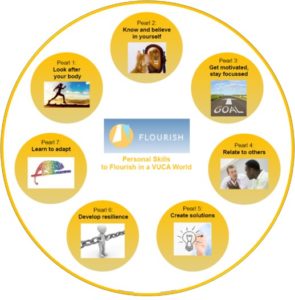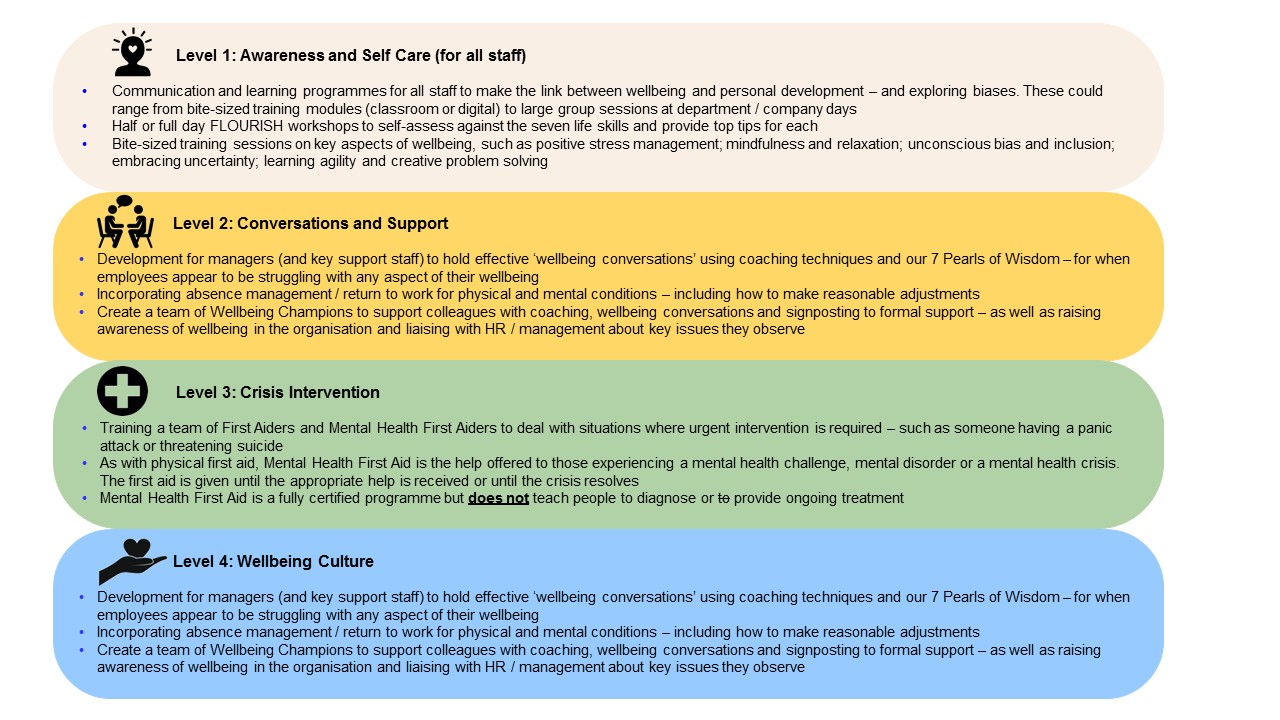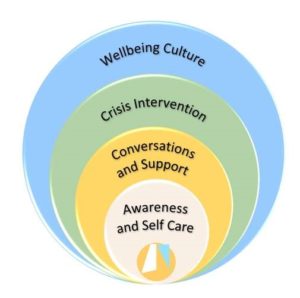 Written by Sharon Young
Written by Sharon Young
There is a lot of talk about mental health right now.
In early October, Ant and Dec ‘paused’ Britain’s Got Talent to launch ITV’s Britain Get Talking campaign and the four young royals (William, Kate, Harry and Meghan) voiced a three minute advert to launch the new NHS campaign – Every Mind Matters. So, as I asked visitors at the recent World of Learning Conference and Exhibition:
‘Why do people still find it so hard to talk about mental health at work?’
I think there are a number of reasons. Firstly, there is still huge stigma and ignorance about the topic.
A good friend of mine recently went to see the new Joker film (2019), which is a much darker look at the character, who is struggling with his mental health. I was appalled to hear that four lads behind him in the cinema were shouting derogatory language at the character – at one point calling him a f****** retard and throwing their drink carton towards the screen. When this sort of behaviour exists in society, it is no wonder people don’t feel comfortable talking about mental health issues in the workplace. As individuals we might not be able to change society’s prejudices and ignorance, but we can do something to support those in our workplaces.
This incident started me thinking about whether this type of ignorance is worsened by the way that we sometimes talk about mental illness rather than mental health. For me, mental health is a much wider topic. How about if we looked at mental health v illness as a continuum, as we would for physical illness – as an example we’ll use a ‘bit of a cold’ at one end and ‘pneumonia’ at the other.
At this time of year, many people will be exposed to a cold virus. Some may be in good health, have a good immune system or take precautions to prevent / reduce the symptoms of a cold. Others may get a bad cold and take some medication to ease the symptoms, slow down a bit to let their body recover, feel grotty for a few days and are then back to full health.

Others carry on at the same pace – they are too busy to slow down – whilst others might have a predisposition from a previous illness. So, for these people, the cold might turn into a chest infection.
At this point some might go to the doctor and get antibiotics, take some time off work etc. Others, again, are too busy or stressed to go to the doctors and carry on as before – or already have a weakened immune system due to some other illness they have gone through recently. In a minority of cases, this might then turn into pneumonia, which can be life-threatening.
It works in a similar way for mental health. We are all exposed to things that can cause us stress / distress. Some people can easily deal with this or employ coping strategies like relaxation or mindfulness. For others, things really build up or there could be a major trauma that triggers a stronger reaction. People may have past experiences or medical conditions that predispose them to be more badly affected. Some people will need medical support and a small minority of people reach the far extreme of the continuum – however, 6,000 people a year still take their own life in the UK and many more have suicidal thoughts.
Obviously, this is a major simplification and there are some conditions that people are born with that cannot be ‘cured’. However, symptoms can be reduced / coping mechanisms increased / reasonable adjustments made to improve quality of life. I am not a doctor and whilst I have done Mental Health Awareness training, I do not claim to understand all the intricacies or impacts of the many different conditions.
However, as a practitioner, it strikes me that this complexity is one of the things that can put people off learning more about mental health. So, I wonder whether a more simplified approach might help to increase general awareness of what to look for and where to go for help. This would need to be supported by more detailed training for some, to support people in the workplace, which I will come onto later.
Secondly, I think too many organisations tackle mental health in isolation – as a specific topic. To me, it is just one part of the much wider puzzle that is physical, emotional and mental wellbeing.
Mental Health Awareness and Resilience were by far the two most well attended sessions that we ran at the recent World of Learning Conference and Exhibition. These were closely followed by Menopause Awareness, Learning Agility (knowing what to do, when you don’t know what to do) and Unconscious Bias. Another topic that is becoming increasingly important for our clients is Embracing Uncertainty as people struggle to cope with constant change.
The more I look into these areas, the more I am convinced that we need to stop treating them as piecemeal topics that some people see as the flavour of the month. They are all inextricably linked and I believe that seeing how they fit together to form a holistic picture will make it much easier for people to engage with the specific aspects in more detail. Why do I say this?

Modern life and the world of work are changing rapidly – and so are the skills and qualities necessary to survive and thrive. We all live in a VUCA world (Volatile, Uncertain, Complex, Ambiguous) and to flourish in these challenging times, successful individuals need to have a range of ‘life skills’.
The World Health Organisation describes Life Skills as “the abilities for adaptive and positive behaviour that enable individuals to deal effectively with the demands and challenges of everyday life.”

We looked at a lot of models / organisations as part of our research and found that wellbeing was often approached as an ‘add-on’ or HR activity rather than a part of the core personal development offering.
This can lead to paying lip service or running as-hoc wellbeing events that are not linked to a wider vision.
As a result, Pearlcatchers created our Flourish portfolio, which integrates personal wellbeing and development into seven key skills individuals need to thrive in the stormy seas of a VUCA world.
As you will see, mental health is not explicitly mentioned, but many of these skills will support good mental health. You don’t have to use this model but making mental health part of the bigger picture of wellbeing and seeing how it all links together may help position it better – both with employees and senior leaders. I hope this might also take away a lot of the fear and ignorance around the topic.
But it is not just about increasing individual awareness and personal skills. This brings me to my third and final point. To really support physical, emotional and mental wellbeing in the workplace, there needs to be a much wider set of activities – involving structures, systems and culture, as well as development.
I have refined this into four levels of intervention that together will support mental, emotional and physical health in the workplace:
 Pearlcatchers can provide you with support, consultancy and learning interventions at all four of these levels.
Pearlcatchers can provide you with support, consultancy and learning interventions at all four of these levels.

It was great to have conversations with other HR / L&D professionals at the World of Learning and see how the
issue of mental health and wellbeing is becoming a priority in organisations. But I know that some people struggle to either:
- See how HR professionals who aren’t mental health experts in this area could help
- Or gain senior buy-in to sponsor programmes and policies
To the first point, I would say that we all talk about doctors, nurses, care workers as being
the caring professions. But L&D and HR are caring professions too – we are all about supporting and developing people. We might not be trained to deal with the serious issues, but awareness and learning can certainly have a huge impact. So, let’s step up and make change happen.
To the second point, some of my explanations in this blog may help to frame a potential business case. In addition, I think the following statistics / quotes can add some weight:
“A healthy workplace is one where employees and managers work together to protect and promote their health, safety and wellbeing and the sustainability of the business.”
World Health Organisation
- 1 in 4 people experience a mental health problem each year
- 1 in 6 people of working age report a diagnosable mental illness
- 1 in 5 people have suicidal thoughts
- Almost 6,000 people in UK take their life every year
- 70-75% of people with mental ill health don’t receive any treatment at all
- Mental ill health is the leading cause of sickness absence in UK
- Mental ill health costs UK employers £34.9 billion each year
- 95% of employees calling in sick with stress, give a different reason
“Supporting mental health in the workplace is not just a corporate responsibility; staff who have positive mental health are more productive and businesses who promote a progressive approach to mental health can see a significant impact on business performance, so it’s about good business too”
Dr Justin Varney, National Lead for Adult Health and Wellbeing, Public Health England
When we talk about viral change – it is about infecting one person at a time with positive attitudes and behaviours. Every revolution started with one person. And if we infect enough individuals with greater understanding about, and positive attitudes towards mental health, then slowly but surely, we will change society too.
I would love your feedback on the thoughts I have expressed in this blog and please let us know if you would like to discuss any of our wellbeing services in more detail. Sharon
Contact our friendly team – 01753 670 187 / hello@pearlcatchers.co.uk
Pearlcatchers – Enabling People and Organisations to Change, Learn and Grow
